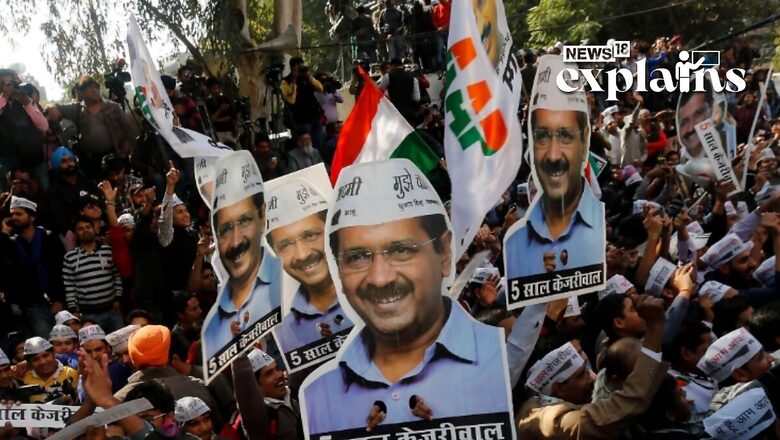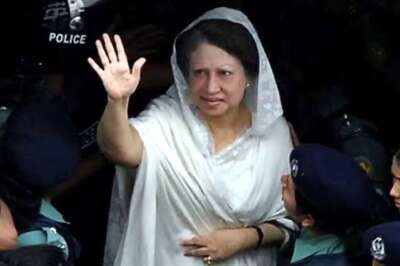
views
The Election Commission of India on Monday recognised Arvind Kerjiwal’s Aam Aadmi Party (AAP) as a national party and has withdrawn the same tag for Mamata Banerjee’s Trinamool Congress (TMC) and Sharad Pawar’s Nationalist Congress Party (NCP). The Communist Party of India (CPI) has also lost the status.
Ahead of the 2024 Lok Sabha polls, this can be seen as a big boost for AAP.
In a series of orders, the ECI said that it has withdrawn the status of TMC, CPI, and NCP as recognised national parties after following due process and providing sufficient opportunity for two parliamentary elections and 21 state assembly polls.
Speaking to News18, an ECI official said that reviewing the performance of recognised national and state political parties is a continuous process under the Election Symbol Order, 1968, and it is done after every election.
“Since 2019, while the status of three national and six state parties was withdrawn, two parties have been added as national parties and 14 as state parties by the commission…The ECI has upgraded the status of 16 political parties in total and has withdrawn the current status of nine national/state parties since 2019,” the official added, demanding anonymity.
How can a party become a national party?
There are a number of rules that can make a party a state party and, eventually, a national party. One of the simplest rules for a political party to be treated as a national party is to be recognised as a political party in four or more states. If a party is treated as a recognised political party in less than four states, it is a “state party”.
Apart from getting recognition as a state party in four states, political parties can also become national parties if they get six per cent vote share each in any four states in the previous assembly polls along with four seats in the previous Lok Sabha elections; or it gets 2 per cent of all Lok Sabha seats in the previous general election with MPs elected from at least three states.
Rising AAP
AAP became a state party in Delhi in 2013, in Punjab in 2014, and in Goa in 2022. Gujarat went for polls in December 2022 and AAP managed to get state party status there too. Since it is a state party in four states, it is eligible to be a national party.
Soon after the assembly poll results were out for Gujarat in December 2022, AAP declared itself a national party. It is the ruling party in Delhi and Punjab and bagged two seats in the 2022 Goa assembly elections along with 6.8 per cent of the total votes. The party won five seats and secured an overall vote share of 13 per cent in the Gujarat polls.
What went wrong for TMC, NCP and CPI
The TMC lost its national status as it no longer enjoys the state party tag in Manipur and Arunachal Pradesh, as per the latest order. Now, it is a state party in West Bengal, where it has been in power since 2011, and also in Tripura. In addition, the ECI has made it a state party in Meghalaya as well, according to the order issued on Monday.
Mamata Banerjee’s party got the national tag in 2016 after it was declared a state party in West Bengal, Manipur, Tripura, and Arunachal Pradesh.
CPI, one of the oldest communist parties in India and a national party since 1989, has lost its state party tag in Odisha and West Bengal, according to the order. And now it is a state party just in Kerala, Manipur, and Tamil Nadu. Since it is not a state party in four states, the CPI is also no longer a national party in the country.
For NCP, the ECI has said that the party no longer is eligible to be a state party in Goa, Manipur, and Meghalaya. On the other hand, from Monday, the party has gained state party status in Nagaland. Also, it continues to be a state party in Maharashtra. The NCP was a national party since 2000.
Along with these parties, the ECI has also reviewed the status of a number of other regional parties. As per the orders, the Bharat Rashtra Samithi has lost the state party tag in Andhra Pradesh and now it is a state party just in Telangana.
The ECI has also recognised the Tipra Motha Party as a state party in Tripura, the Voice of the People Party has become a state party in Meghalaya, and Lok Janshakti Party (Ram Vilas) is a state party in Nagaland.
Pattali Makkal Katchi has lost the state party tag in Puducherry and now it is just a registered unrecognised political party in the union territory. The same has happened with the Rashtriya Lok Dal in Uttar Pradesh, where it will be treated as a registered unrecognised political party.
India is a vast democracy and any association or body of individual citizens of the country can float a political party. A party needs to get itself registered with the Election Commission of India.
According to the ECI, the political parties in India are either ‘recognised’ or ‘unrecognised’. A recognised party can either be a national party or a state party depending upon its election results. The tag of national or state parties is not permanent and can be altered if they fail to fulfill the criteria to be one.
Read all the Latest Explainers here

















Comments
0 comment